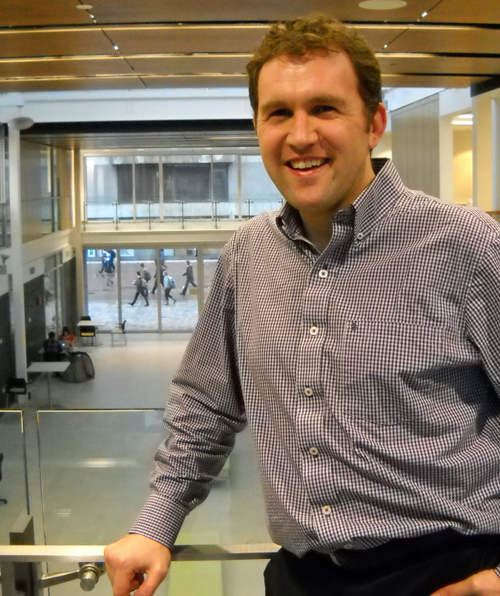
Ryan Clemmer recalls the buzz that year. It was 1998 and the mechanical engineering undergrad had begun his fourth co-op work term at an up-and-coming tech firm in Waterloo, Ont. That was Research in Motion Ltd., where the University of Waterloo student was to help perfect assembly of a new product, the BlackBerry smartphone.
“There was the sense that this was going to be a game changer,” he says.
Back then, Clemmer could have bought in, but not on his student budget. Reflecting on recent news headlines about the company, he says, “I debated getting stock. I ended up going with mutual funds.”
He didn’t buy a smartphone either, then or since. Today the newly arrived U of G engineering professor still has only an ordinary cellphone. He says that’s all the technology he needs – plus various tools to teach courses in the School of Engineering.
Clemmer arrived here at the beginning of January. Designated to spend about 70 per cent of his time in the classroom in the mechanical engineering program, he’s currently teaching second-year fluid mechanics and co-teaching a third-year design course. Next fall he will take on an undergrad course in materials science.
Having taught at Waterloo for the previous year, he was lured partly by U of G’s teaching strengths and reputation. He feels he has something to offer this growing program, one of several learning streams fueling enrollment growth and physical expansion in the Thornbrough and adjoining Richards buildings.
What makes a good teacher? Clemmer ticks off a few traits. Communicate clearly and concisely. Engage the class. Make the material interesting and relevant.
So when you’re teaching fluid mechanics, you relate it to something students know, like blood flow. Or you bring in various materials to give them a hands-on sense. Use audiovisual materials: to convey the power of flowing water, try an arresting video clip of the 2011 Japanese tsunami. Or fan out a card deck to demonstrate varying shear stresses.
Some of those lessons come from his own student days at Waterloo. Earlier, growing up in Elmira, Ont., Clemmer had taken tech classes at high school. He always enjoyed solving problems and taking things apart to see how they worked.
When he got to university, it turned out that fluid mechanics wasn’t his strong suit. His own struggles now prove useful on the other side of the classroom lectern, where he figures he can relate to students’ problems.
Outside of the classroom, he studies fuel cells for sustainable energy in institutions like offices, schools and large residential buildings. As with vehicle fuel cells, this is a fledgling technology, he says.
He hopes his materials studies will help lead toward a more efficient option than conventional energy sources for heating and lighting buildings. Fuel cells might run on energy from a variety of local sources, including hydrogen produced from wind energy or biomass fuels.
Call it the 100-mile energy source. “You can take whatever locally available fuel makes sense rather than try to pipe oil across the continent,” he says. “My research can be part of the solution, taking advantage of waste streams to generate electricity as opposed to relying on fossil fuels.”
He was attracted to U of G’s work in sustainability and environmental issues. For Clemmer, those interests also extend to the classroom. That design course, for instance, sees students completing projects using the new School of Engineering atrium addition as a teaching tool, from its green roof plots and rainwater harvesting system to its rooftop solar cells and wind turbine.
Clemmer began looking at solid oxide fuel cells and alternative energy during his post-doc at the University of Calgary, following his PhD completed in 2006 at Waterloo. He returned to Waterloo last year for another post-doc and to teach.
He lives in St. Jacob’s, Ont., with his wife, Kristine, a high school science teacher in Cambridge, and their 16-month-old daughter, Nadia.